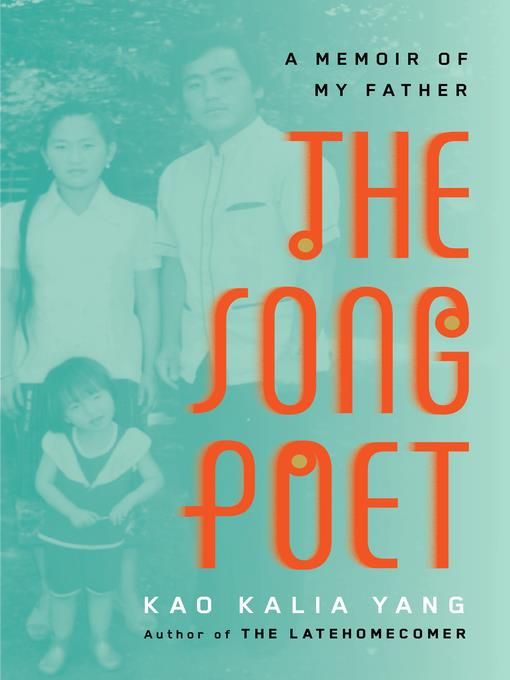
The Song Poet
A Memoir of My Father
کتاب های مرتبط
- اطلاعات
- نقد و بررسی
- دیدگاه کاربران
نقد و بررسی

January 11, 2016
In this beautifully-written memoir, Yang (The Latehomecomer: A Hmong Family Memoir) tells the story of her father, a poet who composed kwv txhiaj in his native Hmong. These songs, she says, taught her how the human heart operates, shielded her from poverty, and showed her windows where she had only ever seen walls. Yang pitches the story as a narrative of how a song poet came to be, from his childhood in Laos, to his flight to America as young adult, to his life there as the father of many. Surprisingly, however, she hardly provides any songs at all, or shows any interest in them after the book’s introductory pitch. There’s no mention of songs created by the child in Laos who might have first experimented with words as he played with his brother, nor by the father who might have used his songs to teach his children what it means to be an immigrant and factory worker. That aside, the story is engrossing as a straight-up narrative of this spirited man’s life. The daughter’s love for her father is described in words as gorgeous as those that (she assures us) the song poet often spoke.

March 1, 2016
A daughter tells her father's story in his own voice. Award-winning memoirist Yang (The Latehomecomer: A Hmong Family Memoir, 2008) focuses on her father, Bee Yang, who transformed his experiences and family's history into songs. Yang and her siblings grew up surrounded by them: "my father sings his songs, grows them into long, stretching stanzas of four or five...raps, jazzes, and sings the blues when he dwells in the landscape of traditional Hmong song poetry." Bee gave up singing after his mother died, in 2003, but as an adult, the author discovered the one cassette he had recorded and was struck by the songs' "humor, irony, astute cultural and political criticism." Yang's evocative, often moving memoir, told from Bee's perspective, reveals a life of struggle, hardship, deep love, and strong family ties. Bee was born during the Laotian civil war and grew to adulthood during the French occupation and the Vietnam War; "more and more men in uniforms entered our lives," he remembered, and Hmong men and boys were recruited to aid the Americans. In 1975, when the Americans left Laos and the communists took over, "genocide was declared against the Hmong for helping the Americans." Yang recounts in harrowing detail the persecution Bee and his community suffered. By 1980, Bee, his young wife, and baby daughter ended up in Ban Vinai Refugee Camp, in Thailand, where their second daughter, the author, was born. During the eight years the family lived there, Bee was forced by Thai soldiers to transport opium "from one uniformed guard to the next," a mission he hated but carried out with "fear and shame." At last, they came to America, where Bee took arduous factory work to support his growing family. Although he encountered prejudice and exploitation, he never lost hope for his children's futures. Yang's gentle prose captures her father's sufferings and joys and serves as a loving celebration of his spirit.
COPYRIGHT(2016) Kirkus Reviews, ALL RIGHTS RESERVED.

Starred review from June 1, 2016
Yang's second stellar memoir (after the The Latehomecomer) takes readers back to the mountains of Laos, to her father's birth and childhood, through the French occupation, and finally to the turbulent war that led to the family fleeing through the jungle to a refugee camp in Thailand and ultimately landing in the American city of St. Paul. Yang writes first in the voice of her father; the second part reveals her own perspective, that of a woman learning to find words in both the language of her Hmong heritage and of her adopted country. These two points of view balance each other and the result captures the raw emotions of grief, joy, fear, and love. VERDICT Yang powerfully demonstrates that much of what society doesn't hold valuable--talents that don't translate into monetary or educational success--still carry immense value. [See Memoir, 2/17/16; ow.ly/Tet6300b88f.]--RD
Copyright 2016 Library Journal, LLC Used with permission.

March 15, 2016
Yang, author of The Latehomecomer: A Hmong Family Memoir (2008), builds upon that beautiful chronicle in this hauntingly lyrical tribute to her beloved father. As she recounts his life as a fatherless child, a refugee, and a stranger in a strange land, a portrait emerges of a spiritual man who heals his soul and elevates the lives of his children with the rich artistry of his homespun compositions. To put it in accessible American terms, Bee Yang raps, jazzes, and sings the blues when he dwells in the landscape of traditional Hmong song poetry. Keeping alive the stories, the history, and the culture of his homeland, he passes them along to his children through an art form steeped in centuries of tradition and lore. Barely keeping poverty at bay, he makes sure his family warm and secure through the bitterly cold Minnesota winters, paying homage to their collective heritage until time and bitter circumstances steal the songs. A memorable and moving immigrant story.(Reprinted with permission of Booklist, copyright 2016, American Library Association.)

























دیدگاه کاربران